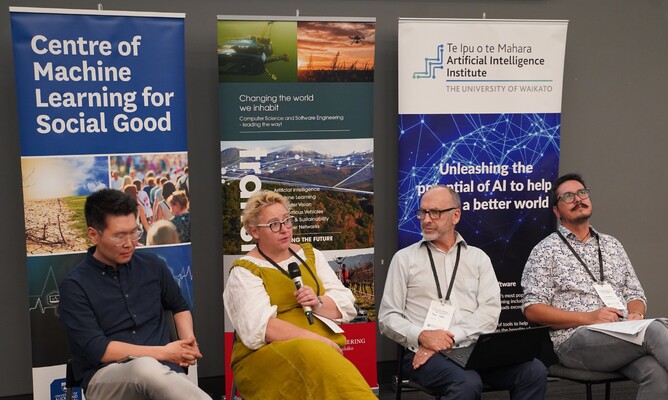On April 11, 2024, AI researchers gathered at the 2024 Artificial Intelligence Researchers Association Conference for a riveting panel discussion chaired by Albert Bifet and Phil Mourot from the University of Waikato. The panelists, Daniel Wilson, Emma MacDonald, Jonathan Kim, and Paul Seiler, shared their expert insights on the transformative potential of AI, particularly within the context of Aotearoa New Zealand.
The discussion kicked off with each panellist sharing their background and perspectives on how AI will shape society. Daniel Wilson from the University of Auckland delved into Māori data sovereignty, highlighting the unique opportunity Aotearoa New Zealand has to lead in indigenous data sovereignty and algorithmic property. He emphasised the transformative potential of AI in areas like predator control, product management, and language revitalization within the Māori economy.
Paul Seiler, General Manager of Catalyst Cloud, brought an industry perspective, stressing the importance of investing in people and supporting their journey with AI. He shared a personal story about his son using AI tools for education, illustrating AI's potential to revolutionize learning environments and foster creativity.
Emma MacDonald from the Interim Centre for Data Ethics and Innovation, Stat NZ drew parallels between the current AI revolution and past technological revolutions, such as agriculture and industry. She underscored the unpredictable nature of these transformations and the need for support during transitions. Emma also emphasized the potential for AI to create diverse and innovative learning environments.
Jonathan Kim from Callaghan Innovation provided insights from both a government agency and a PhD student perspective. He discussed the benefits of AI for researchers in New Zealand, including access to large datasets and computing power, and the potential for New Zealand to compete globally by leveraging AI technology.
Building trust and the need for regulation
A significant portion of the discussion focused on the concept of trust in AI, especially from a Māori perspective. Daniel Wilson highlighted that trust in this context involves reciprocity, relationships, and equitable power dynamics. The panelists agreed that building trust requires meaningful engagement with communities and consistent, trustworthy actions.
The challenge of regulating AI was a recurring theme. Emma MacDonald suggested principle-based regulation would be better to address the problems rather than prescribing specific actions. She also suggested we look to other regulatory roles that already existed, such as expanding the role of the Privacy Commissioner to include AI ethics, emphasizing the importance of international alignment while maintaining New Zealand's unique values.
Education: the foundation for ethical AI
Education emerged as a critical factor in fostering a better understanding of AI ethics and fairness. Daniel Wilson discussed the importance of culturally safe spaces for Māori and Pasifika students in education. He shared efforts to bring Māori students into tech and initiatives like machine learning for social good, highlighting the need for support systems that make space for the work required to build capability and realise the potential culturally equitable AI.
Emma MacDonald pointed out that the current Western education system often fails to accommodate diverse learning styles and creativity. She expressed hope that AI could help break down these barriers, allowing more students to thrive and contribute innovative ideas.
A positive future for AI in New Zealand
The panelists shared their optimism for AI's future impact on society, emphasizing the need for collaboration, ethical considerations, and community engagement. They discussed the potential for AI to empower communities, drive innovation, and create opportunities for diverse talent.
Audience questions brought additional perspectives on regulation, job displacement, and the role of open-source AI. The panelists reiterated the importance of ethical considerations, education, and proactive engagement with communities to ensure AI's positive impact.
Conclusion: navigating the AI revolution together
The NZ AI Researchers Association Conference panel provided a comprehensive overview of AI's potential benefits and challenges. With a strong emphasis on ethical considerations, community engagement, and education, the panelists offered valuable insights into how New Zealand can embrace the AI revolution.

